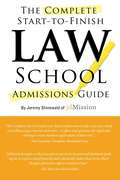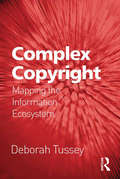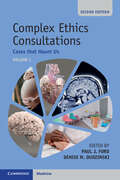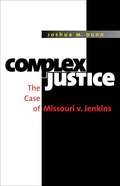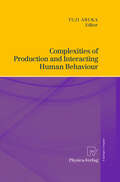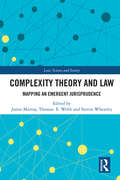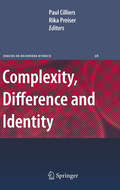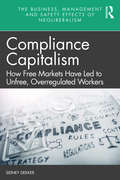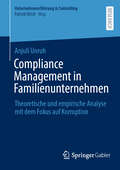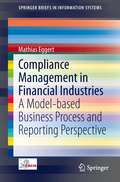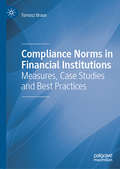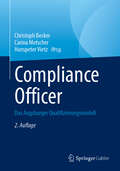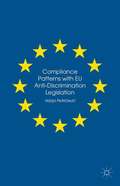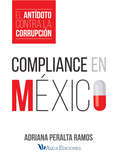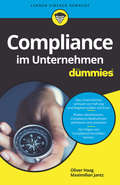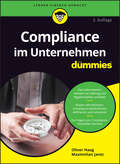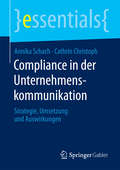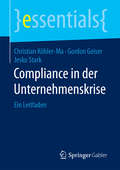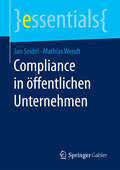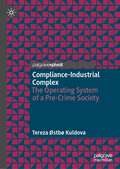- Table View
- List View
Complete Planning Permission: Teach Yourself
by Michael Dade Roy SpeerThe UK Planning Regulations are a minefield for anyone looking to build a new home - and for those who are worried about the impact of a new planning application near their home. Avoid being one of the thousands whose application is turned down - and whose dreams are crushed - by using this book to familiaries yourself with the system and beat it. With a step-by-step guide to every part of the application process and ehaustive coverage of the do's and don'ts this is an essential guide to securing that first step on the path to building your dream home. And if you're worried about a nearby development there are easily implimented strategies for preventing planning permission from being granted. From one of the UK's leading planning consultancies with the very latest on all the new and recent changes to planning law this is the most comprehensive guide avaliable to manipulating the intricacies of this difficult and controversial area.
Complete Start-to-Finish Law School Admissions Guide
by Jeremy ShinewaldCovering every aspect of the law school admission process, veteran admissions consultant Jeremy Shinewald provides time-tested advice and concrete direction for serious law school applicants. Addressing ways to enhance personal statements, resumes, recommendations, addenda, interviews and more, Jeremy takes applicants through exercises to ensure that they create a comprehensive application that will enable them to standout. Filled with examples and insight, The Complete Guide to Law School Admissions is sure to become the go-to guide for law school applicants everywhere.
Completely Free: The Moral and Political Vision of John Stuart Mill
by John Peter DiIulioAn original, unified reconstruction of Mill’s moral and political philosophy—one that finally reveals its consistency and full powerFew thinkers have been as influential as John Stuart Mill, whose philosophy has arguably defined Utilitarian ethics and modern liberalism. But fewer still have been subject to as much criticism for perceived ambiguities and inconsistencies. In Completely Free, John Peter DiIulio offers an ambitious and comprehensive new reading that explains how Mill’s ethical, moral, and political ideas are all part of a unified, coherent, and powerful philosophy.Almost every aspect of Mill’s practical philosophy has been charged with contradictions, illogic, or incoherence. Most notoriously, Mill claims an absolute commitment both to promoting societal happiness and to defending individual liberty—a commitment that many critics believe must ultimately devolve into an either/or. DiIulio resolves these and other problems by reconsidering and reconstructing the key components of Mill’s practical thought: his theories of happiness, morality, liberty, and freedom. Casting new light on old texts, DiIulio argues that Mill’s Utilitarianism and liberalism are not only compatible but philosophically wedded, that his theories naturally emanate from one another, and that the vast majority of interpretive mysteries surrounding Mill can be readily demystified. In a manner at once sympathetic and critical, DiIulio seeks to present Mill in his most lucid and potent form.From the higher pleasures and moral impartiality to free speech and nondomination, Completely Free provides an unmatched account of the unity and power of Mill’s enduring moral and political thought.
Complex Copyright: Mapping the Information Ecosystem
by Deborah TusseyThis book draws on a wide selection of interdisciplinary literature discussing complex adaptive systems - including scholarship from economics, political science, evolutionary biology, cognitive science, and religion - to apply general complexity tenets to the institutions, conceptual framework, and theoretical justifications of the copyright system, both in the United States and internationally. The author argues that copyrighted works are the products of complex creative systems and, consequently, designers of copyright regimes for the global 'information ecosystem' should look to complexity theory for guidance. Urging legal scholars to undertake empirical studies of real-world copyright systems, Tussey reveals how the selection of workable configurations for the copyright regime is larger than that encompassed by the traditional, entirely theoretical, debate between private property rights and the commons. Finally, this unique study articulates how copyright law must tolerate certain chaotic elements that may be essential to the sustainability of complex systems.
Complex Ethics Consultations
by Paul J. Ford Denise M. DudzinskiClinical ethicists encounter the most emotionally eviscerating medical cases possible. They struggle to facilitate resolutions founded on good reasoning embedded in compassionate care. This book fills the considerable gap between current texts and the continuing educational needs of those actually facing complex ethics consultations in hospital settings. 28 richly detailed cases explore the ethical reasoning, professional issues, and the emotional aspects of these impossibly difficult consultations. The cases are grouped together by theme to aid teaching, discussion and professional growth. The cases inform any reader who has a keen interest in the choices made in real-life medical dilemmas as well as the emotional cost to those who work to improve the situations. On a more advanced level, this book should be read by ethics committee members who participate in ethics consultations, individual ethics consultants, clinicians who seek education about complex clinical ethics cases, and bioethics students.
Complex Ethics Consultations: Cases that Haunt Us
by Paul J. Ford Denise M. DudzinskiClinical ethics consultants navigate dilemmas across patient care, public health, and healthcare policy. Issues span from the beginning to the end of life, complex discharges, employment of novel technologies, and visitation restrictions. The second edition relays the narratives of fraught, complex consultations through richly detailed cases. Authors explore the ethical reasoning, professional issues, and emotional aspects of these impossibly difficult scenarios. Describing the affective aspects of ethics consultations, authors highlight the lasting effects of these cases on their practices. They candidly reflect on evolving professional practice as well as contemporary concerns and innovations while attending to equity and inclusivity. Featuring many new chapters, cases are grouped together by theme to aid teaching, discussion, and professional growth. The book is intended for clinicians, bioethicists, and ethics committee members with an interest in the choices made in real-life medical dilemmas as well as the emotional cost to those working to improve the situations.
Complex Justice
by Joshua M. DunnIn 1987 Judge Russell Clark mandated tax increases to help pay for improvements to the Kansas City, Missouri, School District in an effort to lure white students and quality teachers back to the inner-city district. Yet even after increasing employee salaries and constructing elaborate facilities at a cost of more than $2 billion, the district remained overwhelmingly segregated and student achievement remained far below national averages. Just eight years later the U.S. Supreme Court began reversing these initiatives, signifying a major retreat from Brown v. Board of Education. In Kansas City, African American families opposed to the district court's efforts organized a takeover of the school board and requested that the court case be closed. Joshua Dunn argues that Judge Clark's ruling was not the result of tyrannical "judicial activism" but was rather the logical outcome of previous contradictory Supreme Court doctrines. High Court decisions, Dunn explains, necessarily limit the policy choices available to lower court judges, introducing complications the Supreme Court would not anticipate. He demonstrates that the Kansas City case is a model lesson for the types of problems that develop for lower courts in any area in which the Supreme Court attempts to create significant change. Dunn's exploration of this landmark case deepens our understanding of when courts can and cannot successfully create and manage public policy.
Complex Presents Dummy Boy: Tekashi 6ix9ine and The Nine Trey Gangsta Bloods
by Shawn SetaroThe story of one of the most controversial figures in all of hip-hop history, Dummy Boy tells the tale of Tekashi 6ix9ine and his meteoric rise to fame.In tracing Danny "Tekashi 6ix9ine" Hernandez's life from Bushwick to the heights of the rap scene, Complex reporter Shawn Setaro illuminates the story of the young rapper who forged an alliance with a notorious street gang to bolster his image and boost his internet clout. Before long, Tekashi's antics and affiliations caught up with him, leading to a major police investigation that tore apart his team and saw him squarely behind bars, facing a life in prison. A thrilling true crime narrative set in the contemporary hip-hop world, Dummy Boy draws on dozens of exclusive interviews with collaborators, associates, and witnesses, to provide a detailed account of the most beguiling and intriguing story in modern music. More than a biography, Dummy Boy is an American crime story, a critical examination of internet trolling in the Trump era, and an exploration of the long-running connection between rap, gangs, and police in New York City.
Complexities of Production and Interacting Human Behaviour
by Yuji ArukaAs the real world is rapidly becoming more and more complicated, economists need to venture beyond the boundaries of mainstream economics and integrate philosophical thought and complexity into their analytical frameworks. In this context, this volume brings together papers on economic theory and its related issues, exploring complex production systems and heterogeneously interacting human behavior. The author challenges economists to integrate economic theory and moral science anew by referring to evolutionary economics and socio-econophysics. The three parts of the book focus on the complexities of production and social interaction, the moral science of heterogeneous economic interaction, and the Avatamsaka's dilemma of the two-person game with only positive spillovers.
Complexity Economics for Environmental Governance (Cambridge Studies on Environment, Energy and Natural Resources Governance)
by Jean-François MercureIn Complexity Economics for Environmental Governance, Jean-François Mercure reframes environmental policy and provides a rigorous methodology necessary to tackle the complexity of environmental policy and the transition to sustainability. The book offers a detailed account of the deficiencies of environmental economics and then develops a theory of innovation and macroeconomics based on complexity theory. It also develops a new foundation for evidence-based policy-making using a Risk-Opportunity Analysis applied to the sustainability transition. This multidisciplinary work was developed in partnership with prominent natural scientists and economists as well as active policy-makers with the aim to revolutionize thinking in the face of the full complexity of the sustainability transition, and to show how it can best be governed to minimize its distributional impacts. The book should be read by academics and policy-makers seeking new ways to think about environmental policy-making.
Complexity Theory and Law: Mapping an Emergent Jurisprudence (Law, Science and Society)
by Steven Wheatley Jamie Murray Thomas WebbThis collection of essays explores the different ways the insights from complexity theory can be applied to law. Complexity theory – a variant of systems theory – views law as an emergent, complex, self-organising system comprised of an interactive network of actors and systems that operate with no overall guiding hand, giving rise to complex, collective behaviour in law communications and actions. Addressing such issues as the unpredictability of legal systems, the ability of legal systems to adapt to changes in society, the importance of context, and the nature of law, the essays look to the implications of a complexity theory analysis for the study of public policy and administrative law, international law and human rights, regulatory practices in business and finance, and the practice of law and legal ethics. These are areas where law, which craves certainty, encounters unending, irresolvable complexity. This collection shows the many ways complexity theory thinking can reshape and clarify our understanding of the various problems relating to the theory and practice of law.
Complexity, Difference and Identity: An Ethical Perspective (Issues in Business Ethics #26)
by Rika Preiser Paul Cilliers"Complexity" has been part of the academic discourse for a decade or two. Texts on Complexity fall mainly in two categories: fairly technical and mathematical on the one hand, and fairly broad, vague and general on the other. Paul Cilliers' book Complexity and Postmodernism. Understanding Complex Systems (Routledge 1998) constituted an attempt to bridge this divide by reflecting more rigorously on the philosophical implications of complexity, and by making it accessible to the social sciences. This edited volume is a continuation of this project, with specific reference to the ethical implications of acknowledging complexity. These issues are pertinent to our understanding of organisations and institutions and could contribute significantly to the development of a richer understanding of ethics in business and would be a useful tool for teachers, researchers and post-graduate students with ethical concerns in disciplines ranging from Philosophy, Applied Ethics, Sociology, Organisational Studies, Political Science, Anthropology and Cultural Studies. The central theme which binds all the contributions together is: the inevitability of normative and ethical issues when dealing with complex phenomena. The book should thus be useful in the development of Business Ethics on two levels: in the first place on the level of developing a strong theoretical foundation, in the second place in providing specific examples of this theory in action in the real world.
Compliance Capitalism: How Free Markets Have Led to Unfree, Overregulated Workers (The Business, Management and Safety Effects of Neoliberalism)
by Sidney DekkerIn this book, Sidney Dekker sets out to identify the market mechanisms that explain how less government paradoxically leads to greater compliance burdens. This book gives shape and substance to a suspicion that has become widespread among workers in almost every industry: we have to follow more rules than ever—and still, things can go spectacularly wrong. Much has been privatized and deregulated, giving us what is sometimes known as ‘new public management,’ driven by neoliberal, market-favoring policies. But, paradoxically, we typically have more rules today, not fewer. It’s not the government: it’s us. This book is the first of a three-part series on the effects of ‘neoliberalism,’ which promotes the role of the private sector in the economy. Compliance Capitalism examines what aspects of the compliance economy, what mechanisms of bureaucratization, are directly linked to us having given free markets a greater reign over our political economy. The book steps through them, picking up the evidence and levers for change along the way. Dekker’s work has always challenged readers to embrace more humane, empowering ways to think about work and its quality and safety. In Compliance Capitalism, Dekker extends his reach once again, writing for all managers, board members, organization leaders, consultants, practitioners, researchers, lecturers, students, and investigators curious to understand the genuine nature of organizational and safety performance.
Compliance Management in Familienunternehmen: Theoretische und empirische Analyse mit dem Fokus auf Korruption (Unternehmensführung & Controlling)
by Anjuli UnruhAnjuli Unruh beleuchtet in diesem Buch die zunehmende Bedeutung von Compliance-Management als Bestandteil einer nachhaltigen Corporate Governance, insbesondere in mittelständischen Familienunternehmen. Sie reagiert auf die wachsende Relevanz von Wirtschaftskriminalität und die damit verbundenen Herausforderungen, die durch regulatorische Anforderungen und öffentliche Erwartungen verschärft werden. Im Mittelpunkt steht das Spannungsfeld zwischen gesetzlichen Vorgaben, individuellen Governance-Strukturen und den soziokulturellen Besonderheiten von Familienunternehmen. Ziel ist die Entwicklung eines konzeptionellen Ansatzes, der die Führungs- und Kontrollstrukturen in mittelständischen Familienunternehmen systematisch abbildet und dabei die Wechselwirkungen zwischen Compliance-Management, Wertschöpfung und Korruption berücksichtigt. Die Analyse liefert praxisnahe Erkenntnisse und evidenzbasierte Handlungsempfehlungen zur Verbesserung des Compliance- und Anti-Korruptionsmanagements. Sie trägt zur Erweiterung der Wissensbasis im Bereich der Unternehmensführung bei und zeigt auf, wie Compliance-Management als Erfolgsfaktor für eine werteorientierte und nachhaltige Unternehmensführung in mittelständischen Familienunternehmen implementiert werden kann.
Compliance Management in Financial Industries: A Model-based Business Process and Reporting Perspective (SpringerBriefs in Information Systems)
by Mathias EggertSince the peak of the world financial crisis in 2008, compliance management has gained more and more interest from practice and research. In particular the financial service industry is strongly regulated and has to follow specific laws, standards and guidelines. Considering the steadily increasing number of legal requirements in the design of information systems is a challenge to financial service providers. This book investigates the challenges of compliance management in financial industries and provides solutions for a compliant design of information models. From a business process perspective, an approach is presented that enables the automatic checking of business process models. From a supervisory reporting perspective a modeling technique is presented that allows for modeling regulatory data warehouse requirements as well as its analysis. Besides these two perspectives the author provides insights into the perceived relationship of Information Systems and Law.
Compliance Norms in Financial Institutions: Measures, Case Studies and Best Practices
by Tomasz BraunInitially, introducing compliance functions within the financial industry had been forced by regulatory scrutiny. Later, it started to spread to other regulated companies, in particular those publicly listed. Now, compliance has become an asset of corporates that want to build their reliability among clients, shareholders, employees and business partners. This book looks at the efficiency of the compliance measures introduced and the best practices of building compliance norms.This recently observed practice of compliance was triggered by the expectation of regulators, shareholders, clients, business partners and the public for robust compliance mechanisms. This book looks at the vast interest in this topic among business people who strive to introduce the systems and the mechanisms of non-compliance risk management in their companies and at the uncountable difficulties and obstacles they meet. The book fills the gap of thorough analysis of this subject by pointing out the solutions successfully introduced in global financial organizations, and would be of interest to academics, researchers and practitioners in corporate finance, corporate governance and risk management.
Compliance Officer: Das Augsburger Qualifizierungsmodell
by Christoph Becker Carina Metscher Hanspeter VietzAufbau, Implementierung und Gelebtwerden einer Compliance-Organisation in Unternehmen erfordern eine ganzheitliche Sichtweise auf das Thema. Ausgehend von juristischen und betriebswirtschaftlichen Fragestellungen beleuchten die Beiträge dieses Bandes die wichtigsten Compliance-Risiken in Unternehmen. Die Autoren diskutieren die Implementierung im Rahmen der Unternehmensorganisation und legen besonderes Augenmerk auf die IT-Strukturen. Die persönlichen Anforderungen an den Compliance-Beauftragten sowie die ethische Verantwortung im Bereich der Compliance bilden einen weiteren Schwerpunkt. Die konsequent praxisorientierte Behandlung des Themas Compliance wird im Kapitel "Praxisfragen der Compliance" mit Themen wie Compliance und M&A, Collective Action, Compliance im Konzern explizit betont.
Compliance Patterns with EU
by Vanja PetričevićThis book provides an in-depth and timely analysis of the member states' compliance patterns with the key European Union Anti-Discrimination Directives. It examines the various structural, administrative, and individual aspects which significantly affect the degree and the nature of compliance patterns in select European Union member states.
Compliance en México: El antídoto contra la corrupción
by Adriana Peralta Ramos¿Cómo generar una cultura laboral sustentada en integridad y ética? El ser humano es ambicioso por naturaleza, consecuentemente desea poseer riqueza y poder, pero esta ambición natural no justifica el uso de medios ilegales ni el abuso del poder o autoridad para obtenerles. Cuando el individuo utiliza medios nocivos para alcanzar sus fines, se convierte en corrupto, en criminal. Evitar que las personas saquen provecho indebido de sus puestos de trabajo y se beneficien de manera ilícita de sus actividades es el tema de este libro. Adriana Peralta hace un análisis profundo del problema y ofrece soluciones reales. COMPLIANCE es un camino probado, es el más corto y la mejor respuesta para crear un comportamiento íntegro y ético en el mundo laboral.
Compliance im Unternehmen für Dummies (Für Dummies)
by Oliver Haag Maximilian JantzErfüllt Ihr Unternehmen die gesetzlichen Vorgaben? Die Rechtsfolgen bei Compliance-Verstößen können erheblich sein. Wer sich also mit Compliance auskennt, die Risiken kennt und zu vermeiden oder zumindest zu begrenzen weiß, der ist gut beraten. Dieses Buch zeigt, mit welchen konkreten Compliance-Maßnahmen Sie Ihr Unternehmen sauber halten und sich wirkungsvoll gegen Compliance-Verstöße wie zum Beispiel Korruption oder andere Regelverstößeschützen können.
Compliance im Unternehmen für Dummies (Für Dummies)
by Oliver Haag Maximilian JantzErfüllt Ihr Unternehmen die gesetzlichen Vorgaben? Die Rechtsfolgen bei Compliance-Verstößen können erheblich sein. Wer sich also mit Compliance auskennt, die Risiken kennt und zu vermeiden oder zumindest zu begrenzen weiß, der ist gut beraten. Dieses Buch zeigt, mit welchen konkreten Compliance-Maßnahmen Sie Ihr Unternehmen sauber halten und sich wirkungsvoll gegen Compliance-Verstöße wie zum Beispiel Korruption oder andere Regelverstößeschützen können.
Compliance in der Unternehmenskommunikation: Strategie, Umsetzung und Auswirkungen (essentials)
by Annika Schach Cathrin ChristophDas Essential bietet eine umfassende Einführung in die Kommunikation von Compliance aus konzeptioneller, redaktioneller und rechtlicher Perspektive. Annika Schach und Cathrin Christoph beschreiben die Maßnahmen der internen und externen Kommunikation, die notwendig sind, um alle relevanten Stakeholder zu erreichen. Darüber hinaus schildern sie die Besonderheiten bei der Verschriftlichung von Verhaltensregeln in Form eines Code of Conduct und gehen auf den Einfluss von Compliance auf die Medien- und PR-Arbeit ein - inklusive Einblick in die Praxis in Form eines Interviews mit einem der Redakteure von Europas größtem Automobilmagazin.
Compliance in der Unternehmenskrise: Ein Leitfaden (essentials)
by Christian Köhler-Ma Gordon Geiser Jesko StarkDieses essential bietet einen umfassenden #65533;berblick #65533;ber die aus Compliancegr#65533;nden zu beachtenden Pflichten der Gesch#65533;ftsleitung in der Krise ihres Unternehmens. Die Autoren geben f#65533;r die typischen Krisenphasen konkrete Handlungsempfehlungen und erl#65533;utern Situationen, die zu einer pers#65533;nlichen Haftung f#65533;hren k#65533;nnen. Schlie#65533;lich wird der Ablauf eines Insolvenzverfahrens erkl#65533;rt und der Leser erf#65533;hrt, welche Auswirkungen dies auf Sanierungschancen und Haftungsthematiken hat. Beachtung finden auch die zahlreichen Fallstricke und Stolpersteine im Zusammenhang mit Unternehmenskrisen, welche unter anderem durch die Vielzahl der widerstreitenden Interessen der verschiedenen Beteiligten entstehen.
Compliance in öffentlichen Unternehmen (essentials)
by Jan Seidel Mathias WendtDas essential beleuchtet die spezifischen Risiken der persönlichen Haftung für öffentliche Unternehmen. Die Autoren lassen ihre Erfahrungen aus der Errichtung und Prüfung von Compliance-Strukturen in Unternehmen der öffentlichen Hand einfließen. Die Entwicklung der Rechtsprechung in jüngerer Zeit hat gezeigt, dass die Risiken der persönlichen Haftung auch für Entscheider in Unternehmen der öffentlichen Hand ein relevantes Berufsrisiko darstellen. Dabei spielt die Organisationsform (öffentlich-rechtlich oder privatrechtlich) keine nennenswerte Rolle.
Compliance-Industrial Complex: The Operating System of a Pre-Crime Society
by Tereza Østbø KuldovaThis is the first book to examine the growth and phenomenon of a securitized and criminalized compliance society which relies increasingly on intelligence-led and predictive technologies to control future risks, crimes, and security threats. It articulates the emergence of a ‘compliance-industrial complex’ that synthesizes regulatory capitalism and surveillance capitalism to impose new regimes of power and control, as well as new forms of subjectivity subservient to the ‘operating system’ of a pre-crime society. Looking at compliance beyond frameworks of business management, corporate governance, law, and accounting, it looks as it as a social phenomenon, instrumental in the pluralization and privatization of policing, where the private intelligence, private security, and big tech companies are being concentrated at the very core of compliance, and hence, governance of the social. The critical book draws on transversal, rather than interdisciplinary, approaches and integrates disparate perspectives, inspired by works in critical criminology, critical algorithm studies, critical management studies, as well as social anthropology and philosophy.

